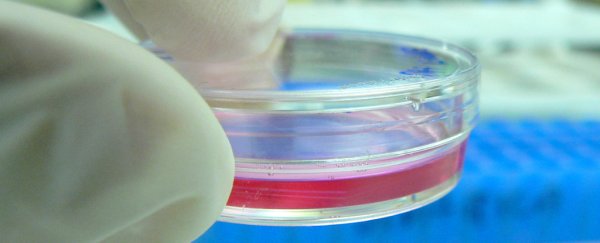Earlier this morning, the Australian High Court ruled that the BRCA1 gene - which is linked to a significant increase in breast and ovarian cancer risk - isn't a "patentable invention". The decision means that a single company will no longer be able to control research on the gene, or receive all the profits from testing for it.
Prior to this, US biotech company Myriad Genetics held the patent for BRCA1 in Australia, and its claim was upheld by the Federal Court during two earlier cases. But now the High Court has overturned those rulings and declared that the gene can't be patented, as it's simply been isolated, and not manufactured, by Myriad.
The decision comes two years after a similar ruling was made by the US Supreme Court, which declared in June 2013 that naturally occurring DNA, such as the BRCA1 gene, couldn't be patented.
The case against Myriad Genetics in Australia was led by two-time cancer survivor Yvonne D'Arcy from Brisbane, who endeavoured to make breast cancer genetic testing more affordable for everyone, and open up the research so new treatments for genetic diseases could be developed.
"The testing will be a lot cheaper and it will be more available … rather than using only Myriad's agents at a price that nobody really can afford," D'Arcy told ABC News after her win. "For all those people who do have the genetic footprint for breast cancer or any cancer basically, it's a win for them because now they're forewarned."
Myriad's argument was that its researchers had created an "artificial state of affairs" by isolating the gene from the human body, and that by patenting BRCA1, they were insuring that research into the gene would be commercialised. But the High Court unanimously decided today that the gene didn't classify as having been "manufactured" - one of the requirements for patent law in Australia.
"While the invention claimed might be, in a formal sense, a product of human action, it was the existence of the information stored in the relevant sequences that was an essential element of the invention as claimed," the High Court concluded in a statement to the press.
Incidentally, Myriad's patent had expired in August anyway, so the decision won't have an impact on the availability of BRCA1 testing in Australia. But it's a landmark ruling that sets a precedent for future cases over proprietary of the human genome.
"We have been waiting almost 30 years for a decision of this nature, on the issue of whether isolated DNA sequences are patentable subject matter," said Dianne Nicol, director of the Centre for Law and Genetics at the University of Tasmania. "What is important is its effect on the availability of patents in new areas of technology more generally.
